Aaron Roth – Edify.org – “Neighborhood Missionaries” – Aug/Sept. 2014

I’m still in Peru working with the local partner to establish the first few schools of our Edify program in Lima. We had a big school conference last month where over 50 schools and approximately 240 participants came to learn about our program, receive business training and Christian development training for their school. I hope to update you all on our progress this coming month, but let me use this newsletter to talk about a family very close to me in the Dominican Republic. -Aaron
- Download this email as a pdf: Aaron Roth – Aug-Sept. 2014 Update.pdf
- Edify worldwide – www.Edify.org
- Archive: AaronRoth.net – Monthly Newsletters
I have had many unique experiences over the past four years in Latin America and most of them have happened while living with a local family. “Live with a family” is usually the advice I give to anyone considering taking the time to study a language. I believe that language is really about living life, and there’s no better place to live daily life, than
 with a family.So for that, I have to credit most of the Spanish I use every day, to the experiences from all the birthdays, church services, buying strange foods and eating them, and the endless cultural or language faux pas I’ve committed. But it’s not just words and phrases I picked up from them; I have learned a tremendous amount about local culture, and how to understand that very culture I intend to serve, and how living a life of witness goes even deeper than simply proclaiming those words.
with a family.So for that, I have to credit most of the Spanish I use every day, to the experiences from all the birthdays, church services, buying strange foods and eating them, and the endless cultural or language faux pas I’ve committed. But it’s not just words and phrases I picked up from them; I have learned a tremendous amount about local culture, and how to understand that very culture I intend to serve, and how living a life of witness goes even deeper than simply proclaiming those words.
Inside the American church, I had often felt like the perspective of a ready missionary was to “go, serve, and witness” with a heavier focus on the “witness” than on the “serve.” Christian witness of course is the application of the great commission of Christ, commanding us to go into the world and make disciples in the image of Christ. (Matt. 28:19) But what that often implied to me was that the people we were going to go witness to had no idea who Christ was and needed to be introduced to him through the formal methods of evangelism. Of course, as any short or long-term missionary can attest to, the ones being “sent” from the United States, end up “receiving” a good deal of the transformation themselves in the process of witnessing, or intending to transform the local community.
And so it was with me. I have had the great blessing of being able to live life with three different host families: in Guatemala, in Nicaragua and in the Dominican Republic, and I

The reason why still fascinates me to this day. Apparently, about 10 years ago one of their children fell incredibly sick and needed better health care outside of the Dominican Republic. Through a sponsor, Rebecca was able to take her sick child to the United States and during the three months, a family from a church (I believe it was in Ohio or Michigan) took her and her son into their home. (Sadly, they lost that son to a terminal illness during that visit to the States). This family treated her like one of their own, and she knew that someday the Lord would call on her to do the same thing.

So there I was, “the caller,” in the fall of 2010, being welcomed in with open arms and being crawled over by their two sons, Josias of four years and Railyn of eight. Thus began one of the most remarkable periods of my life – living with a Dominican family in the ghetto – and experiencing all that happens on a day to day basis, just like another child of the family.
So let me tell a quick story: one day, I was at home and I received a knock at the door from Rebecca’s sister. She was in hysterics because her daughter was having complications during the delivery of her child and was losing blood rapidly. Because of the economic conditions in that area, the clinic where the girl was a patient would not dispense the necessary blood until an economic sponsor came to pay for the procedure and the blood. This is an all too common story in these tough areas: lack of insurance and lack of paying clients pushes these health clinics to accept these kinds of policies.
I told Rebecca’s sister that the boys and Federico would be home soon, and soon after they arrived, Rebecca came rushing in after leaving work early in the only car the family owned. Federico and Rebecca were calm, and even though I had only been a “son” for two weeks, they entrusted me with their boys, and raced off to the clinic to purchase the blood so that their niece and newborn would live.
There are countless stories that impacted me over the past four years with them, but maybe the most impressive thing was how a story like this was a regular occurrence where the family did what Christ called them to do. They consistently made the right decisions, to  love, to not ask questions, to respect, to stand firm, to ask questions, to forgive, to be just, and to practice grace.
love, to not ask questions, to respect, to stand firm, to ask questions, to forgive, to be just, and to practice grace.
On my last visit with them exactly two months ago, Federico was busy in the men’s leadership of his church organizing and managing the disciplining program which paired up older men of the faith with younger men, some of who never grew up with their fathers. They also had a niece staying with them who has had some trouble at home. And like always, when we had a meal, instead of just the six of us, they prepared enough food for the three cousins, and two neighbors who just dropped on by.
You see, their definition of “family” and “witness” are one in the same.
—–
What I believe happens overseas is that most of these heroes of the faith go unsung and their stories diluted. The American church gets the filtered and friendly stories from their representative abroad (like yours truly). While this isn’t optimal, it’s certainly not terrible, because I believe that the spirit of the story makes its way to you and people like Federico and Rebecca never go looking for any kind of acclaim. They just live their lives following the example of Jesus in the neighborhood where God has called them.
That I believe is what a true missionary is. Someone who listens to God’s voice in their life, relies on the Holy Spirit to guide them to live the life that Christ calls them to live.
So then, it is with incredibly sad news that I tell you about the death of a fellow missionary.
—–
Last week, someone had emailed me that Rebecca was very sick. I didn’t know this person so I inquired with some friends to call the family. At just about that time, I received another email telling me that Rebecca was in grave condition in the hospital. It was

Because you see, Rebecca, was my mother too. Her children were my brothers, and her husband was my Dominican dad. They were the people that helped to center me during my two years in the Dominican Republic and translated so many Dominican slang into common Spanish for me. They were the people that helped me understand that if you really wanted to serve people in the name of Christ it had less to do with shuffling papers and managing inboxes and more to do with being present in a community that desperately needed His hope.
Federico and Rebecca showed me that the first mission field is the family, and they have raised two great young men. On my last visit, their sons showed me their report cards from school, and told me how even though they didn’t like homework, they still knew it was part of their daily schedule. Josias was improving in his English, being quite the talker like his American brother (me), and Railyn had already memorized the books of the Bible and could recite to me memory verses from the past month.
What you also do not know is that while I have been working in microfinance for roughly four years, Rebecca was a branch manager of a microfinance organization for about 12 years. Often we talked about the need for access to credit for the economically poor, and how the follow-up after making the loan to continue with the relationship was more important than the loan itself.
She loved the idea of providing small business loans to low-cost Christian schools like what we do in Edify. She would have carried the banner for that idea in her organization, because she believed in education in the home.
—–
I know what Rebecca would do if she knew I was writing about her. She’d smile and brush off the compliments with a simple response that she had told me many times:
“If this is who you are, then this is what you do.”
“Since, then, you have been raised with Christ, set your hearts on things above, where Christ is seated at the right hand of God. Set your minds on things above, not on earthly things. For you died, and your life is now hidden with Christ in God. (Colossians 3:1-3 NIV)”
She really did live like she had her heart on the things of heaven, and I know her family will continue her legacy.
—–
Would you pray for her husband, her two boys, their niece, and all her family in their time of grieving?
Thank you for listening. My prayers be with all of you as well.
Blessings,
-Aaron


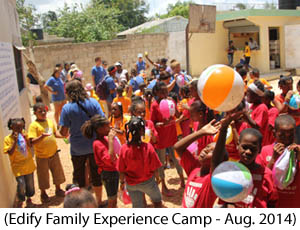
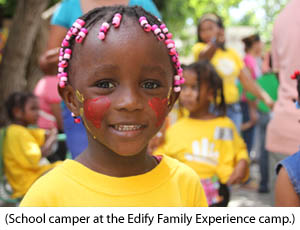 By having the ability to experience different economic realities during the day and discussing these differences using a technical guide, we allow guests to learn the theory at night and see it in practice during the day. I believe this is very important for our guests – including our staff – because when you have an open discussion on what works vs. what doesn’t, and what helps vs. what hurts, everyone benefits and we reduce the tendency to think of ourselves as superior, wealthier Americans with a lot to give and foreigners who are just waiting to receive.
By having the ability to experience different economic realities during the day and discussing these differences using a technical guide, we allow guests to learn the theory at night and see it in practice during the day. I believe this is very important for our guests – including our staff – because when you have an open discussion on what works vs. what doesn’t, and what helps vs. what hurts, everyone benefits and we reduce the tendency to think of ourselves as superior, wealthier Americans with a lot to give and foreigners who are just waiting to receive.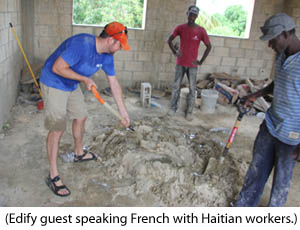 better than trying to mandate the feelings or conclusions people come away with.
better than trying to mandate the feelings or conclusions people come away with.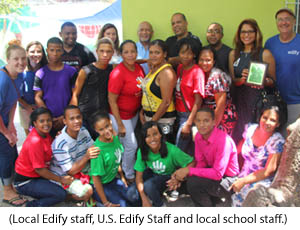
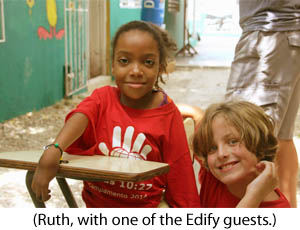
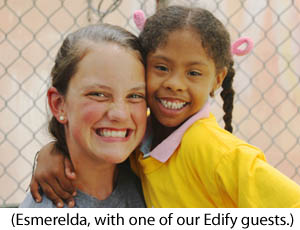 she needs a bit more management because she has Down’s syndrome, but you could also say she’s tuckered out from being around so many people she wants to meet.
she needs a bit more management because she has Down’s syndrome, but you could also say she’s tuckered out from being around so many people she wants to meet.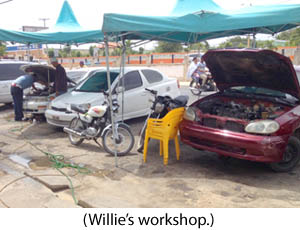
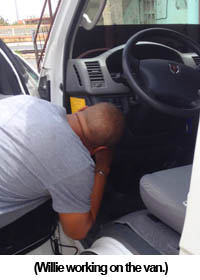
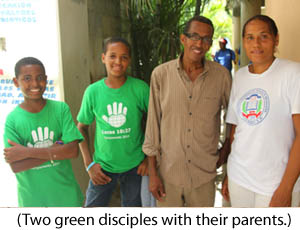
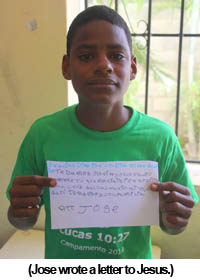 Republic for a long time. They want to connect, so they asked me what my last name is to find their uncle, me, on Facebook. I joke with them that I don’t know it, and when I ask for suggestions for last names I ask them who some famous Dominican baseball players are.
Republic for a long time. They want to connect, so they asked me what my last name is to find their uncle, me, on Facebook. I joke with them that I don’t know it, and when I ask for suggestions for last names I ask them who some famous Dominican baseball players are.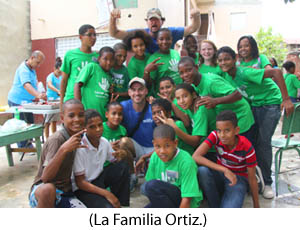
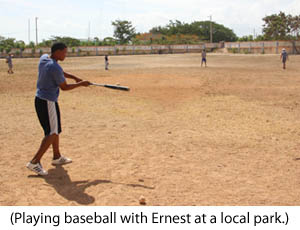
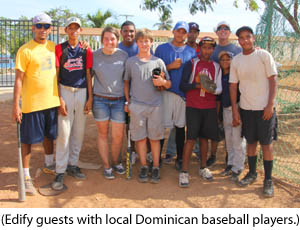 I asked him about what he thought of his younger brother, “You know, he’s the real natural. When he gets his growth spurt, I think he’s got potential. But I don’t want him to go down the road I did. I want him to have a better future. I want him to finish school first.”
I asked him about what he thought of his younger brother, “You know, he’s the real natural. When he gets his growth spurt, I think he’s got potential. But I don’t want him to go down the road I did. I want him to have a better future. I want him to finish school first.”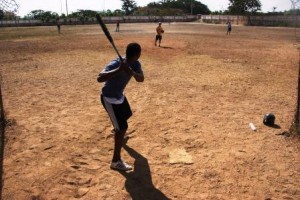
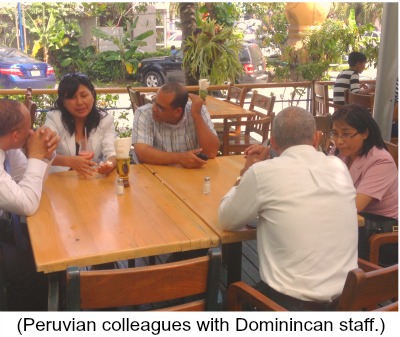
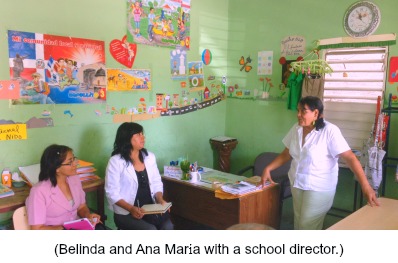
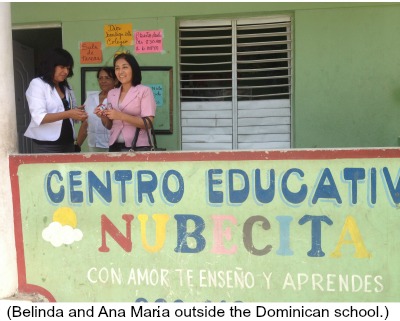
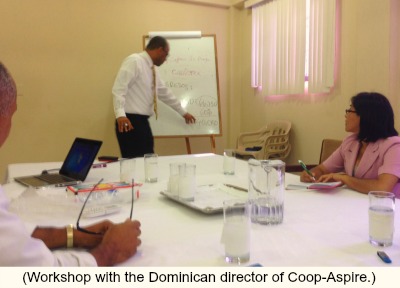 Honestly, the middle was hard. It was hard for the simple reason that I came with a purpose, and I hadn’t been able to fulfill it. Let me remind you though, that this is kind of an American struggle. Many of my Latin America friends do not usually align their feelings of spiritual fulfillment with career success. (I’ve often said to many of my friends back home that Americans aren’t really fulfilled unless they are slightly dissatisfied with their progress. How can we ever find peace with this kind of mentality? Anyway, that’s a topic for another newsletter . . .)
Honestly, the middle was hard. It was hard for the simple reason that I came with a purpose, and I hadn’t been able to fulfill it. Let me remind you though, that this is kind of an American struggle. Many of my Latin America friends do not usually align their feelings of spiritual fulfillment with career success. (I’ve often said to many of my friends back home that Americans aren’t really fulfilled unless they are slightly dissatisfied with their progress. How can we ever find peace with this kind of mentality? Anyway, that’s a topic for another newsletter . . .)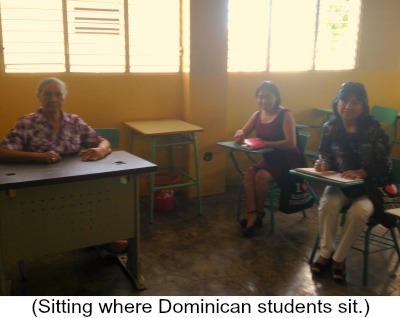
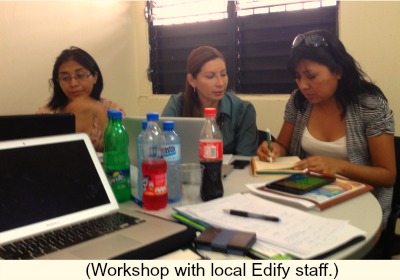
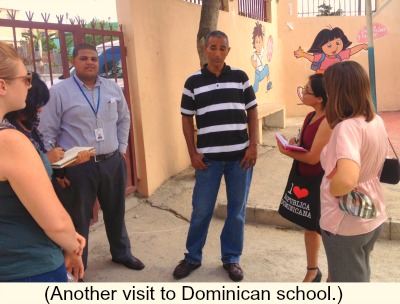

 Edify –
Edify – 
 That memory is full and recent, and I can still taste it.
That memory is full and recent, and I can still taste it.
 when people find a true source of happiness.
when people find a true source of happiness.

















 Blog and Support Page:
Blog and Support Page:  session led by a CPA with 15 years of experience working with small, affordable, private Christian schools. Immediately their faces showed interest and they were expecting the huge price to come next, but I continued on, explaining that with his financial advice, he would walk us through how to prepare an operational budget for the upcoming school year. We’d have coffee, drinks, and sandwiches. Best of all, it would be free.
session led by a CPA with 15 years of experience working with small, affordable, private Christian schools. Immediately their faces showed interest and they were expecting the huge price to come next, but I continued on, explaining that with his financial advice, he would walk us through how to prepare an operational budget for the upcoming school year. We’d have coffee, drinks, and sandwiches. Best of all, it would be free.
 more.” It was a simple recipe: quality material, easy to understand examples, relevant training for school leaders.
more.” It was a simple recipe: quality material, easy to understand examples, relevant training for school leaders. It really makes me think about a key point, through all of my mission work down here: It matters what we believe, it matters what we do, and what we dedicate ourselves to.
It really makes me think about a key point, through all of my mission work down here: It matters what we believe, it matters what we do, and what we dedicate ourselves to. For me, I gave up a lot to be here in the Dominican Republic to serve with HOPE International and Esperanza International. I don’t make a salary here. I have been supported by my church, friends, and family. They believed in what I was doing because I believed in it myself.
For me, I gave up a lot to be here in the Dominican Republic to serve with HOPE International and Esperanza International. I don’t make a salary here. I have been supported by my church, friends, and family. They believed in what I was doing because I believed in it myself.

